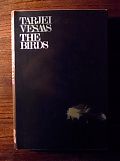
Tarjei Vesaas
The Birds
How to describe Tarjei Vessas’s prose? Writing about The Ice Palace I used the adjective, haunting. For his writing is so complexly simple, so unconsciously sure and steady, so that while reading I felt myself being born into his text. There is a starkness, a whittling down only to the necessary, while simultaneous fullness prevails.
The best illustration of these contradictions is in Vesaas’s main character, Mattis. Known as “Simple Simon” throughout the village, yet his inner-imagery-life is as complex as any inner-life can be. Mattis is a man in his thirties who has been supported all his life, first by his parents and then by his older sister Hege. Mattis can’t hold a job, he can’t do much. He can sit for hours a day throwing pebbles into the lake.
Then, a woodcock begins a flight over Mattis and Hege’s house. The woodcock is a harbinger, Mattis knows. When the woodcock’s first evening flight was finished,
When he looked up, there were beams of light where the woodcock had flown. Straight over his house. […] Things are going to be different from now on, he thought before falling asleep, curled up in his bench like a child. For me? The thought sent a flood of warmth through him.
Mattis works for half-a-day attempting to weed turnips, and meets two young sweethearts who pinch each other’s legs. He takes his rickety rowboat into the lake where he nearly drowns, pulls himself to an island and meets two vacationing girls, Anna and Inger, who are pleasantly nice and receptive of him. Mattis begins work as a ferryman; ferrying, he finds, is the only job he can do. His mind keeps straight and steady like the straight and steady course he rows across the surface of the lake.
Mattis’s mind makes connections between the events in his world that the “clever” one can’t see. He is a visionary able to pick out the symbols inherent in daily life and bring them to the surface. The names, Anna and Inger, mean everything to him. The woodcock gets shot and Mattis buries the bird under a rock. For Mattis, the world is alive and meaningful; through Mattis, Vesaas makes strong use of repetitive symbols, which lends the book a dreamscape.
Yet, Mattis is unable to see or sympathize with his sister’s unsatisfactory life. And when the lumberjack Jørgen enters their life, Mattis is unable to be happy in Hege’s obvious happiness. Change comes, but change unexpected.
The world was full of forces you couldn’t fight against which suddenly loomed up and aimed a crushing blow at you. […]—no, these forces were so powerful that he, Mattis, ferried his own misfortune across the lake, in his own boat, and asked it into his own house. What could you do when things were like that?
The Birds is a quietly strong novel, working its way into the reader, staying with one long after it’s finished. I am grateful for the publishers Peter Owen, for bringing and keeping Tarjei Vesaas’s works into translation. He is writer who deserves to be read and re-read.
· · · · · · · · · · · · · · · · · · · ·